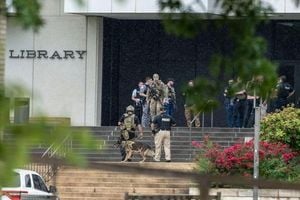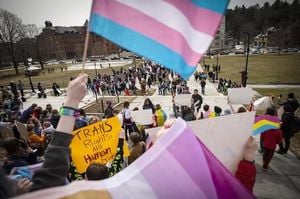Puerto Rico is grappling with a severe water crisis that has prompted Governor Jenniffer González to declare a state of emergency and activate the National Guard. The declaration came on July 30, 2025, after a massive water outage left thousands of homes and businesses across the island without service, spotlighting long-standing infrastructure issues and sparking public outrage.
At the height of the outage late last week, nearly 180,000 customers were affected, a staggering number on an island of 3.2 million residents. Though some progress has been made, as of the emergency declaration nearly 3,000 customers—including nearly a dozen hotels—still remained without water. The ongoing disruptions have hit the tourism sector particularly hard, with hotels struggling to maintain operations amid the water shortage.
The crisis was triggered by damage to a main water line during road repair work last week, specifically a breakdown in the pipeline of the raw water intake from the Carraízo dam, which supplies water to the metropolitan area. Despite the severity of the incident, the Puerto Rico Aqueducts and Sewers Authority (AAA), the state agency responsible for water and sanitation, has declined to identify the company responsible for the damage. This lack of transparency has further fueled public frustration and criticism.
Municipal officials have been working to alleviate the crisis by setting up water distribution points and delivering drinking water door-to-door. The National Guard’s activation means additional support in logistics, transportation, and coordination of water distribution efforts, aiming to reach those most affected as quickly as possible. Governor González emphasized the urgency of the situation, stating, “As long as I have 11 hotels without water and residents without service, of course we have an emergency.”
In an effort to manage the crisis and prevent future incidents, the governor has appointed a special coordinator tasked with stabilizing the water system, investigating the AAA, and determining exactly how the breakdown occurred. This coordinator is expected to deliver a report within 10 days, by August 9, 2025. Despite mounting criticism, González announced that the executive director of the AAA would remain in their position, signaling continuity in leadership amid the turmoil.
The emergency declaration was formalized through Executive Order 2025-44, which grants the AAA’s executive president authority to identify and address any other critical infrastructure or regions requiring urgent stabilization, repair, rehabilitation, or mitigation. This order also mandates that all projects related to the emergency be processed with agility and priority, while ensuring compliance with environmental regulations and safeguarding public health and safety.
The National Guard’s involvement is a pivotal part of this response, providing personnel and equipment to assist the AAA with the complex task of managing water transportation, coordination, and distribution. This collaboration aims to ease the burden on municipal agencies and ensure that drinking water reaches vulnerable communities across multiple municipalities, including San Juan, Carolina, Trujillo Alto, and Canóvanas, where “oases” or water supply points have been established.
Unfortunately, this recent crisis is not an isolated incident. Dozens of communities across Puerto Rico have long struggled with water supply issues, reflecting systemic challenges in the island’s water infrastructure. The current emergency has only exacerbated these longstanding problems, exposing the fragility of essential services and the pressing need for comprehensive infrastructure investment and reform.
Governor Jenniffer González, who was sworn in on January 2, 2025, is now confronting one of the most severe infrastructure crises of her administration. Her swift move to declare a state of emergency and mobilize the National Guard underscores the gravity of the situation and the government’s commitment to restoring water service as quickly as possible.
The public’s reaction has been one of frustration and anger, particularly over the lack of accountability regarding the damaged water line. Many citizens and local officials have called for greater transparency and faster action to prevent similar failures in the future. As the investigation unfolds and the special coordinator’s report is anticipated, pressure will mount on the AAA and government officials to deliver tangible solutions.
Water is a fundamental necessity, and its scarcity affects every facet of daily life—from households to businesses, and critically, the tourism industry, which is a vital component of Puerto Rico’s economy. The ongoing outages have not only disrupted daily routines but also threatened public health and safety, making the emergency declaration and National Guard activation essential steps in crisis management.
As Puerto Rico navigates this challenging period, the hope is that the emergency measures and investigations will lead to lasting improvements in the island’s water infrastructure. For now, residents and businesses remain vigilant, relying on coordinated efforts between government agencies, the National Guard, and local communities to restore a reliable water supply.






